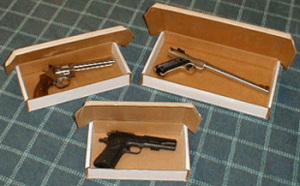When I move, how do I get my guns from another state to Pennsylvania where I now live?
Most people relocate at one time or another. If you’re moving out of state, moving has a lot of things to worry about. For law abiding gun owners, transporting your precious firearms to your new home is usually a priority. Unfortunately, it can get a bit tricky. Hopefully your new home’s state and local laws are friendly to law abiding gun owners. However, what about the states in between? Law abiding gun owners with the best of intentions can unfortunately face staunch legal repercussions for simply crossing the wrong border. Even with the federal safe passage provision in 926A, people have run into trouble. Some states have strict magazine limits, and others interpret 926A so narrowly as to take away its effect. If there’s a chance you’ll end up in a state whose lawmakers have whittled away at the Second Amendment, it might be best to find an alternative method to transport your firearms. After all, it’s better to be safe than sorry. For the purposes of this post, we will presume that the firearms you would like to transport are legal to own in both the state they are presently in, and the state which is their final destination.
Option 1: Ship Your Firearms With a Federal Firearm License (FFL) Holder
Under Federal Law, firearms may only be shipped interstate when addressed to an FLL holder (aside from two exceptions, which we’ll discuss later). While shipping the firearm does not require an FFL, those without an FFL will encounter certain restrictions. For instance, a non-FFL holder can’t ship handguns via USPS.
Going through an FFL holder has its advantages. First, it is more than likely that the FFL holder you use has shipped guns in the past. After all, this is part of what they do for a living. They will be able to help you through the process, and provide you with extra assurance that you’re exercising your Second Amendment Rights responsibly. Equally as important, they can give you tips as to how to best package your firearms so they don’t get damaged in transit.
Option 2: USPS
If you’re sending non-NFA regulated long guns within your own state, USPS is a simple and efficient option. Provided the guns are unloaded, you may mail them within the state via USPS. The box “must bear a ‘Return Service Requested’ endorsement, and must be sent by Express Mail (‘signature required’ must be used at delivery) or Registered Mail, or must include either insured mail service (for more than $200) requiring a signature at delivery.” http://about.usps.com/postal-bulletin/2011/pb22321/html/updt_001.htm
Be sure that you don’t send your long guns in the box you purchased them. Indicating that a firearm is within the box is illegal under federal law.
Unfortunately, unless you’re an FFL, USPS won’t be an available option to transport your handguns during your move. Under the policy stated by USPS, “Handguns and other firearms capable of being concealed on the person are nonmailable unless mailed between the parties listed in this section . . . .Handguns may also be mailed between licensed manufacturers of firearms, licensed dealers of firearms, and licensed importers of firearms in customary trade shipments, or for repairing or replacing parts.” http://pe.usps.com/text/pub52/pub52c4_009.htm
Option 3: Private Shipping Company
- UPS
UPS is a viable option for shipping your guns, and fortunately they will ship handguns. According to policy, all firearms must be shipped separately from ammunition. You must ship your firearms “Delivery Confirmation Adult Signature Required” and place a sticker on each package indicating that an adult signature is required for delivery.
Be careful, because UPS will only ship handguns if you use UPS Next Day Air Services. Additionally, UPS will only accept firearms for delivery at a UPS Customer Center or through a UPS Scheduled Pickup Account. Firearms may not be shipped using UPS Drop Boxes, UPS On-Call Pickup, at locations of The UPS Store, or through any third party retailer.
One downfall of UPS is that they will not accept transfers from individual to individual, even for long guns being shipped in-state.
- Fed Ex
Fed Ex’s policies are very similar to those of UPS. Anybody can ship either handguns or long guns, provided they are being shipped to an FFL. However, like UPS, Fed Ex will not accept transfers from individual to individual, even for long guns being shipped in-state.
Similar to UPS, you must use the “Direct Signature Required or Adult Signature Required Delivery Signature Option” when sending your firearms. You must use FedEx Priority Overnight service when shipping any firearms. You also may not send your firearms using a Fed Ex Drop Box, and must inform Fed Ex that your parcel contains a firearm.
Exceptions
Legally, there are two exceptions to the requirement that any interstate shipment of firearms go to an FFL. However, practically, these do not generally come into play because of the policies set forth above. First, an individual may mail firearms to himself in another state. For instance, if you are moving from Oklahoma to Pennsylvania, you can legally send your firearms to yourself, care of a family member who lives in Pennsylvania. Only you are legally allowed to open the package containing your firearm, so it is important that you provide one of those “do not open until Christmas” type notifications.
The other exception which comes into play involves shipping non-NFA long guns intrastate. As explained above, this is perfectly legal under federal law so long as the firearms and individuals are compliant with state law. However, UPS and Fed Ex both have policies prohibiting these kinds of shipments, so you will be fairly limited.
Reminders
Just a few reminders should you choose to ship your firearm:
- Don’t ship a loaded weapon.
- Don’t ship a weapon to another individual.
- Don’t put your package containing firearms in a drop box.
- Don’t ship your firearm in its original box, or in any way mark that a firearm is contained inside (this is a violation of federal law).
- Be smart and be certain before shipping a firearm. The laws are constantly changing. When in doubt, use an FFL.
There are clearly pros and cons to each of the options listed above. We recommend looking into each available option should you need to ship your firearm(s). This is an important decision, because if done improperly, the experience can be extremely troublesome. On the other hand, if done properly, these shipping options can help reunite law abiding gun owners with their beloved firearms.





